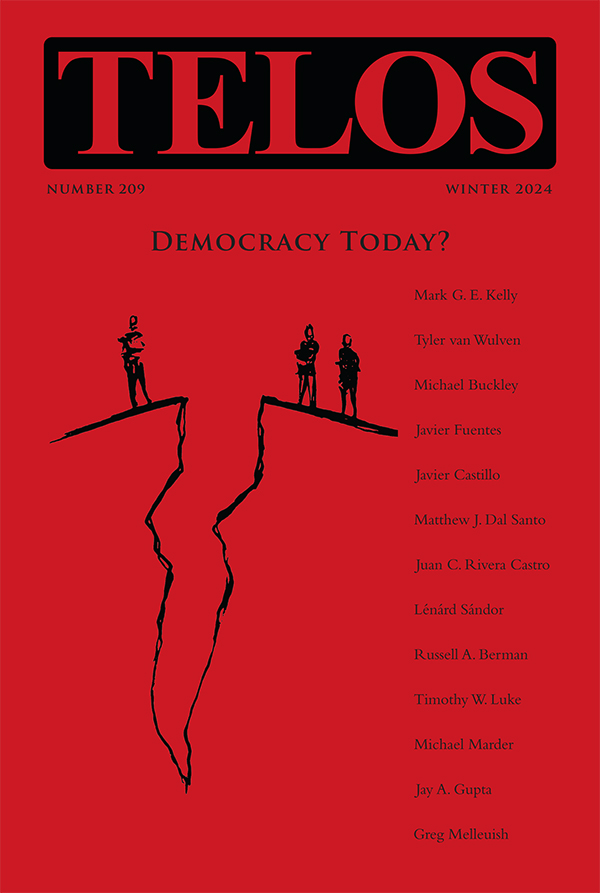Telos 209 (Winter 2024): Democracy Today? is now available for purchase in our store. Individual subscriptions to Telos are also available in both print and online formats.
 Since the supposed triumph of liberal democracy with the end of the Cold War, democracy seems now to be in retreat. The hung parliaments in France and Germany, reminiscent of the divides of Germany’s Weimar Republic; the just-in-time reversal of the declaration of martial law in South Korea; the increasing authoritarianism of China, Iran, and Russia; and the deterioration of democratic norms in the United States are all indications that the liberal democratic end of history was a chimera.
Since the supposed triumph of liberal democracy with the end of the Cold War, democracy seems now to be in retreat. The hung parliaments in France and Germany, reminiscent of the divides of Germany’s Weimar Republic; the just-in-time reversal of the declaration of martial law in South Korea; the increasing authoritarianism of China, Iran, and Russia; and the deterioration of democratic norms in the United States are all indications that the liberal democratic end of history was a chimera.
What is the situation of democracy today? Are the present problems simply growing pains in the inevitable march of history, or are there fundamental limitations of this political form? Is democracy a stable form of government or a delicate balancing act that will always be at risk of deteriorating and being replaced by some form of authoritarianism?
These current indications of the precarity of democracy also coincide, however, with an intense concern for its future. Never has there been such a focus on democracy as a political goal. During the Cold War, the United States, more concerned about promoting capitalism than defending democracy, supported capitalist authoritarianism in places such as Chile, South Korea, and Taiwan. But as it turned out, capitalism did not really need such political backing. In the Cold War between capitalism and communism, the latter lost based on its inability to produce economic growth. Insofar as communism’s undermining of private property and market mechanisms proved to be economically catastrophic, even nominally communist governments in China and Vietnam have since voluntarily embraced capitalist economic policies. Aside from U.S. college campuses, the only diehard Marxists left are in Cuba, North Korea, and Venezuela, all of whose governments are presiding over the immiseration of their peoples.
While it was the Soviet Union, and not capitalism, that collapsed under the weight of its own contradictions, the general recognition of these contradictions meant that communism could only maintain itself by using repressive methods. Communism has been one of the surest ways of moving toward and cementing authoritarianism and totalitarianism. By contrast, capitalist authoritarianism has sometimes led to democratic reforms, and we can point again to Chile, South Korea, and Taiwan, but also to the countries of Eastern Europe, as successful transitioners to democracy within a capitalist framework. Unfortunately, while communism might correlate strongly with authoritarianism, the link between capitalism and democracy does not seem to be so tight.


